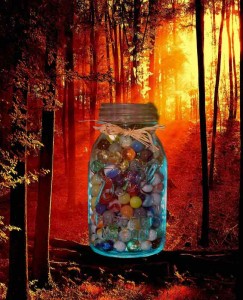Jessica Augustsson
The big quart jar of glass marbles had stood collecting dust atop Grandma’s kitchen cupboards for as long as I could remember, and was as much a part of that room as the ancient enamel sink. It had been in our family for generations. I’d glimpsed it in old family photos; sometimes in the photographs, it looked like it was filled with striped candies, and sometimes with sparkling jewels. But growing up, whenever I looked at the real jar, it was glass marbles—the clear kind with brightly colored bands swirling through the center. Once, when I was very small, I’d asked if I could play with the marbles.
“What marbles?” she asked, sounding genuinely uncertain what I was referring to.
I pointed up to the top of the cupboard. “Those.”
Without glancing, she smiled, still looking a bit confused, and shook her head. “Those, uh, aren’t ordinary marbles. They’re not for playing with.”
“What are they?”
“One day I’ll tell you, Hannah. When you’re older.”
She shooed me out of the kitchen to go play, which I happily did, quickly distracted by young fluffy chicks and a new batch of kittens out in the barn. I remember having wondered about the jar on occasion, but for some reason, I never asked about it and it wasn’t until many years later that I had reason to reflect on what she’d said.
Grandpa rushed in one evening when I was about fifteen, accompanied by the lady from up the road carrying her little boy. The boy’s face was ashen and his leg was twisted around in a strange way. His mother’s eyes were red from crying, and a large patch of her cheek was very swollen. She looked frightened and desperate.
Grandpa directed her towards the sofa in the living room. “There are blankets and pillows in the closet. You get some out while I get some things to help your boy.”
She nodded quietly, happy I think to have been given explicit instructions.
Grandpa then turned to Grandma and they spoke in hushed voices. Though I couldn’t make out everything, there were snippets.
“…again? What happened…”
“…damned jackass! He’s been drinking again and…no money…”
“But the boy! How did he…”
“…hafta set that leg…”
Finally, Grandpa reached into the large, low bureau where he kept an emergency bottle of whiskey and poured a small splash into one of the coffee mugs that was hanging on pegs above the cabinet. Handing the mug to the woman, he urged her to have a sip and to give a sip to the boy.
Grandma beckoned me to follow her into the kitchen.
“Up there. I need you to get me the jar.”
Grandma was five feet tall exactly, and I’d passed her in height the year I’d turned twelve. At fifteen, I towered over her and it was my habit to grin and pat her on the head whenever I walked past. Despite my extra height, even I needed something to stand on to reach the top of that cupboard. I scooted over one of the heavy mahogany dining chairs with red leather upholstered seats. The chair was undoubtedly older than I was by a long shot, and had clearly seen better days. Nevertheless, it was sturdy and supported me as I stood on tippy toes, reaching up to just barely grasp the jar in my outstretched fingertips.
The jar began to vibrate very gently and it issued a soft, sweet hum as I took it down from its resting place. I relinquished it to Grandma’s waiting hands and from the other room we suddenly heard the boy cry out and his mother shriek.
Grandma’s face was grim as she turned to leave the kitchen with the jar. I hopped down from the heavy chair and followed her into the living room. Grandpa was busy splinting the boy’s leg, his foot now pointing the way it ought. His mother sat in the sofa sobbing gently and cradling her son. While she looked relieved, somehow there was still an underlying fear emanating from her.
This was not the first time I’d seen that look on her face. Nor the first time I’d seen it covered in bruises and welts. Everyone in the valley knew her husband—had known him all his life. He’d been brought up in an unhappy household, and instead of using that to turn his life in a new direction, he buried it in drink, which just loosed the monster inside him.
This woman had tried to hide her husband’s secrets for him, though what are secrets if everyone knows them? And how do you help someone who refuses it? But this time, she’d not been the only one to bear the brunt of his temper.
Gramps looked furious, like he was about to do something drastic, until he turned and saw Grandma come in carrying the jar, then his face relaxed and he nodded.
Grandma put her hand gently on the lady’s shoulder and placed the jar in her lap. She whispered something I didn’t catch and she looked confused.
I saw the marbles begin to glow, each one emitting its own colored light, and the humming got louder.
“Go on,” urged Grandma.
She reached slowly, cautiously into the jar and plucked out one of the glowing marbles.
“Now you hold tight to that,” instructed my grandmother. “And everything will be all right.”
She then tilted the jar towards the little boy, tears still streaking his face. “One for you too.”
The boy’s eyes grew large as he put his chubby little arm into the jar. Pulling out his hand, he opened his fingers and gasped at the red and white jawbreaker he found there. Without hesitation, he popped it into his mouth and grinned, the color returning to his apple-cheeked face.
Grandma then inclined her head to Grandpa and he nodded once in response.
“Now, Charles here is going to take you both home, and you just hang onto that for the rest of the evening and focus all your thoughts and desires on it. Think of what you want your life to be. When your husband gets home, you drop it into his whiskey and make sure he drinks every last drop.”
“That won’t be difficult,” she replied, with a sad, lopsided grin.
Grandma handed the jar back to me. I decided the glow I had seen must have been the light of the sunset through the windows, because the marbles just looked ordinary again, no vibrations or sounds either. I must have imagined the whole thing. Grandma must have hidden some jawbreakers among the marbles as a joke. Maybe that’s why she didn’t want me playing with it when I was little? Did she think I would swallow a marble by mistake?
Not completely certain what had really happened despite my rationalizations, I trotted back into the kitchen and replaced the jar on the top of the high cupboard.
When I returned to the living room, everyone had gone but Grandma, who stood folding the blankets and putting them away.
“Where did the marbles come from?” The question blurted out before I could think of a better thing to ask.
She put the last blanket into the deep closet under the stairs and patted the foot-thick brick wall. “My grandfather built this house, you know? In 1899?”
I nodded. I had heard the stories, seen the brick over the front door where he’d carved his name and the year.
She went on. “The clay used to make the bricks was from a spot just down by the stream at the bottom of the field. As my grandfather was digging out the clay, he found a large leather pouch. The leather was rotting away and he just knew somehow that he needed to find a new container. He brought the pouch inside and upended the contents into that jar, and there it’s stood ever since.”
I nodded, thinking of all the family photos I’d seen the jar in. Every one of them was taken somewhere in the kitchen of this old house, I realized. Or at least at some angle where the jar could peek through the tall doorways. More questions popped into my head, but Grandpa arrived home then, and I got no further explanation. Grandma always was good at answering only the question being asked. We ate supper in silence, each thinking our own thoughts about the evening.
“Grandma, did you hide candy in the jar?” I asked her the next morning as she stood making pancakes.
She laughed. “I knew you wouldn’t be satisfied. Poor me a cup of coffee, please. And make one for yourself.”
It wasn’t the tone she used when she sounded too busy and was trying to boot me out of the room, so I did as she asked, handing her a mug of black coffee, and going to the fridge to pour some milk in mine.
“You see how we both enjoy the coffee, but we each like it to be different?” she instructed more than asked. “There’s even espresso and cappuccino and dark and light roasts and beans grown in different countries… One thing, but so many possibilities. The jar is like that. When it wants you to know more, it will tell you. And that’s all I will say about that. Now finish your coffee and then go set the table and call your Grandpa for breakfast.” She kissed my forehead and went back to her electric griddle, dribbling out pancake batter into perfect circles.
Left with that cryptic answer, I wondered again what I’d really seen, only now my doubt was focused more on my rationalizations. How could I have imagined all those little details?
I was not asked to fetch the jar again, but I’d look up at it in quiet moments, when brushing my teeth in the morning before school or giving the cat some cream in the night. The surface remained equally dusty, but sometimes the marbles looked like they’d been jostled. Often I fancied I heard the reassuring hum lulling me to sleep in my little bedroom upstairs from the kitchen. I always had vivid and adventurous dreams on those nights.
I didn’t see much of the woman or her husband in the following years, but when I did, she no longer looked afraid, and he smiled at all the neighbors. I remember her stopping by every once in a while, eyes beaming with gladness, bringing Grandma vegetables from her garden or freshly baked pies to show her gratitude. And the little boy never had any problems with his leg. On the contrary, he grew up to be the local school’s track and field hero.
Many years later, however, I had cause to wonder about them again. Gramps had died some years before, and Grandma and my widowed aunt now shared the house I’d grown up in. I’d gone “home” to visit, to tend to my broken heart. I was not the first wife who had experienced a cheating husband, but at that moment, I felt like I was all alone in my heartbroken misery. My aunt offered words of sympathy and support, and Grandma helped me distract myself with other tasks. And while the sun shone, I knew I could survive this, as so many others must have before me. But at night, the pain and chest-wracking sobs came.
One night I rose, eyes dry and stinging from too much crying and not enough tears. The light was still on in the kitchen and Grandma was seated at the table waiting for me. She indicated the last remaining mahogany chair, kept for reasons of nostalgia.
“Get down the jar, sweetheart.”
I looked up to the high kitchen cupboard and saw the marbles begin to glow, and heard their comforting hum, and it was so powerful and uplifting that I wondered how I could have ever doubted that they had done so before. Scooting the chair over, as I’d done so long ago, I climbed up. Again on tip-toe, I fetched the jar down, the hum louder now, vibrating through my fingers.
“There’s something in there for you,” said Grandma. “Hear the way it sings to you.”
I stretched out my fingers and plunged them down into the jar. Swishing them around through the marbles felt marvelous; they were warm and vibrating with a lovely song, just barely audible. Somehow, they made me think of sunshine and happy brooks, daisies and fluffy chicks, and long-grown kittens, now wise old cats who wound their way around my legs whenever they wanted something.
Suddenly, one marble felt right. Taking it up out of the jar, I gazed at it. The glass was oh so clear with a bright double-swirl of turquoise and blue, like the sea and the sky of my life far from here; the life I’d had with my husband. It glowed. I was certain of it now.
“Hold it tight,” instructed Grandma. “And think of what you want your life to be.”
The simultaneous familiarity and strangeness of the circumstances caused me to falter briefly, but I remembered my heartbreak and wanted only for things to be whole again. I wished for my love and my life back. I didn’t care about what had happened. That wasn’t what was important. I forgave, and I cried.
“Now open your hand and pop it into your mouth!” My grandma winked at my confusion. “Go on.”
Opening my hand again, the marble had turned into a stripy humbug candy, white with turquoise and blue. Putting it tentatively in my mouth, the candy burst open and melted instantly into a tangy-sweet flavor of ripe cherries. I looked up in surprise and a kind of inexplicable joy.
“Oh! I wish I could take the jar with me,” I sighed, though I knew on some level that would be impossible.
Grandma nodded. “Many do. Some have tried, but the jar insists it belongs with the house.”
The telephone rang just then and I knew who it was. I was ready to fight for my life again. He was too.
I returned the dusty jar of ordinary marbles to its high perch, and eventually returned to my far-away home. Grandma’s gone now, and the house has been sold. It nearly broke my heart to let it go, but I remembered what Grandma had said to me and to the neighbor woman. Think of what you want your life to be. I knew it was the future I must focus on. Even now I sometimes wonder if perhaps it was all just a dream, for nothing very strange happened to me. Though it wasn’t easy, like the boy’s mother, I found my way back to happiness, and my life is now full of possibilities.
Tessa pulled out the cardboard box from the back of the musty closet and opened it. This strange old brick house had yielded a few surprises, and despite having left her friends behind, Tessa was beginning to feel better about the move her parents had “forced” upon her. Inside the box, she found a cracked and dirty quart jar that tinkled when the box was jostled. She reached in and held it up in the light streaming in from the window and gasped. It was filled with the most lovely jeweled buttons, vivid greens and bright blues and deep burgundy reds, and she just knew she needed to find a new container for them.



